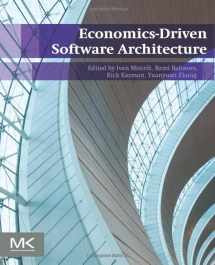
Economics-Driven Software Architecture
Book details
Summary
Description
Economics-driven Software Architecture presents a guide for engineers and architects who need to understand the economic impact of architecture design decisions: the long term and strategic viability, cost-effectiveness, and sustainability of applications and systems. Economics-driven software development can increase quality, productivity, and profitability, but comprehensive knowledge is needed to understand the architectural challenges involved in dealing with the development of large, architecturally challenging systems in an economic way.
This book covers how to apply economic considerations during the software architecting activities of a project. Architecture-centric approaches to development and systematic evolution, where managing complexity, cost reduction, risk mitigation, evolvability, strategic planning and long-term value creation are among the major drivers for adopting such approaches. It assists the objective assessment of the lifetime costs and benefits of evolving systems, and the identification of legacy situations, where architecture or a component is indispensable but can no longer be evolved to meet changing needs at economic cost. Such consideration will form the scientific foundation for reasoning about the economics of nonfunctional requirements in the context of architectures and architecting.


We would LOVE it if you could help us and other readers by reviewing the book
Book review



